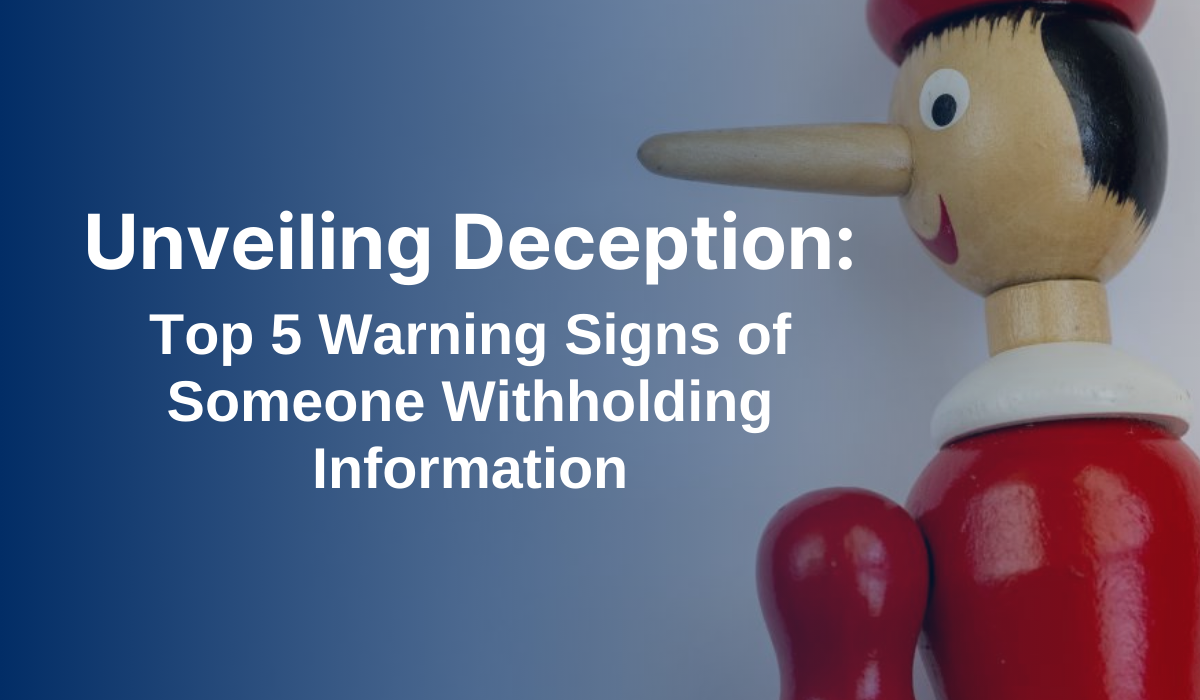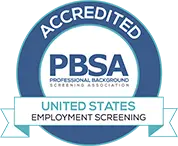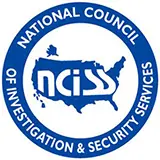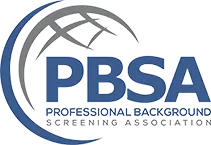In a world where communication is key, the ability to notice the warning signs of someone withholding information can be invaluable. Whether in personal relationships, professional settings, or legal matters, recognizing the signs of hidden truths is crucial for making informed decisions. As licensed (and expert) private investigators we are trained to look for signs of deception. To help you navigate through situations with a more keen eye for true and accurate information, here are some warning signs that someone is withholding information from you.
1. Non-Verbal Cues and Body Language
Communication extends beyond words, and often, non-verbal cues and body language can reveal more than spoken language. People may unconsciously display signs of discomfort, anxiety, or evasion when they are withholding information. Here are key non-verbal indicators to be aware of:
Avoiding Eye Contact
A person who avoids direct eye contact may be feeling uneasy or guilty about the information they are withholding. Eye contact is a fundamental element of open communication, and avoidance can be a red flag.
Fidgeting and Restlessness
Nervous behaviors, such as fidgeting, tapping, or constant movement, can indicate discomfort. These actions may be subconscious attempts to distract from the unease associated with withholding information.
Inconsistent Facial Expressions
Facial expressions can be telling. Pay attention to incongruities between a person’s words and their facial expressions. A forced smile or a furrowed brow when discussing a certain topic may reveal hidden emotions.

Closed Body Language
Crossing arms, turning away, or creating a physical barrier can signify a desire to distance oneself from the conversation. Closed body language suggests a lack of openness and transparency.
Speech Disfluencies
Hesitations, stammering, or excessive use of filler words (such as “um” or “uh”) can indicate that someone is struggling to articulate their thoughts, possibly because they are withholding information.
Understanding these non-verbal cues requires keen observation and an awareness of the individual’s baseline behavior. Sudden changes or inconsistencies in their usual demeanor may point to the presence of withheld information.
2. Vague or Evasive Responses
When someone is withholding information, they may provide responses that are intentionally vague, evasive, or lack detail. This verbal behavior serves as a protective measure, allowing the individual to reveal as little as possible while still appearing cooperative. Key indicators of vague or evasive responses include:
Ambiguous Language
The use of ambiguous language that avoids specifics is a common tactic for someone withholding information. They may speak in generalities or use vague terms to keep the details concealed.

Deflection and Shifting Blame
Withholders often deflect attention away from themselves by shifting blame or redirecting the conversation. If someone consistently avoids addressing the topic at hand and points fingers elsewhere, they may be hiding something.
Overemphasis on Unimportant Details
To distract from the lack of substantial information, individuals may overemphasize minor details or provide an excess of irrelevant information. This diversionary tactic can create a façade of cooperation while maintaining secrecy.
Refusal to Answer Direct Questions
A straightforward and direct question should elicit a clear response. If someone consistently evades direct questions or responds with deflections, it may be a sign that they are withholding information.
Inconsistencies in Statements
Pay attention to inconsistencies in the information provided. Withholders may inadvertently reveal their deception through contradictory statements or conflicting details.
It’s essential to approach conversations with a critical mindset and be attuned to the language choices and communication patterns of those involved. Persistent vagueness or evasiveness may warrant further investigation or clarification.
3. Defensive Behavior and Emotional Responses
When individuals feel threatened or exposed, they may respond defensively or exhibit heightened emotional reactions. Defensive behavior and emotional responses can be strong indicators that someone is withholding information. Look out for the following warning signs:
Excessive Defensiveness
A person who becomes excessively defensive when questioned may be attempting to protect themselves from revealing information. Defensive responses often include a heightened emotional tone, justifications, or even aggression.

Anger or Irritability
Strong emotional reactions, such as sudden anger or irritability, can be an attempt to deflect attention away from the information being withheld. Emotional outbursts may serve as a distraction to steer the conversation in a different direction.
Inconsistent Emotional Expressions
While inconsistency in facial expressions was mentioned as a non-verbal cue, inconsistencies in emotional expressions extend to overall emotional responses. Pay attention to emotional shifts that seem disproportionate to the context.
Avoidance of Emotional Topics
Withholders may actively avoid discussions that involve emotional topics or personal experiences. The avoidance is a protective measure to prevent the disclosure of information that might be emotionally charged.
Sudden Change in Tone or Volume
A noticeable change in the tone or volume of speech may indicate emotional discomfort. A person withholding information may unintentionally reveal their internal struggle through these auditory cues.
It’s crucial to approach discussions with empathy and sensitivity, as defensive behavior can stem from various underlying factors. However, recognizing these warning signs allows individuals to explore the reasons behind the defensiveness and address potential withheld information.
4. Unexplained Gaps or Inconsistencies in Information
When someone is withholding information, there may be unexplained gaps or inconsistencies in the details they provide. These gaps can be subtle clues that prompt further investigation. Be on the lookout for the following indicators of information withholding:
Missing Timeline Details
A person withholding information may provide a narrative with significant gaps in the timeline. Pay attention to missing or unexplained periods within their account.
Conflicting Accounts from Different Sources
In cases where information is obtained from multiple sources, inconsistencies between these accounts may signal that someone is withholding information. Discrepancies in details or events can highlight hidden truths.
Contradictions with Known Facts
Compare the information provided with known facts or established truths. If there are contradictions or discrepancies, it may indicate that someone is not sharing the complete story.

Unexplained Changes in Story
Individuals withholding information may alter their narrative over time. Be wary of sudden changes or revisions to the story, as they may be attempts to cover up or obscure certain details.
Lack of Specifics or Details
Withholders often provide information that lacks specificity or crucial details. They may offer generalizations instead of concrete facts, creating a veneer of cooperation while keeping essential information concealed.
When assessing information, maintain a meticulous approach and seek clarity on any inconsistencies or gaps. A thorough examination of the details provided can uncover hidden information and prompt further inquiry.
5. Unwillingness to Collaborate or Provide Documentation
A person withholding information may be hesitant to collaborate or provide supporting documentation that could verify their claims. A reluctance to share additional details or evidence may indicate an attempt to keep certain information hidden. Look for the following signs of unwillingness to collaborate:
Resistance to Verification
Individuals withholding information may resist efforts to verify their statements or claims. They may avoid providing access to relevant documents, witnesses, or other forms of verification.
Reluctance to Involve Others
Withholders may be hesitant to involve other parties who could shed light on the situation. This reluctance to include additional perspectives may be a deliberate effort to control the narrative.
Refusal to Provide Evidence
A person withholding information may avoid offering concrete evidence or documentation that supports their assertions. A lack of willingness to provide proof can be a red flag.
Avoidance of Open Communication
Withholders may steer clear of open and transparent communication. They may resist discussions that involve multiple parties or collaborative problem-solving, preferring that there is a use of some semblance of open communication.
Recognizing the warning signs of information withholding is paramount in fostering genuine communication and making well-informed decisions in various aspects of life. Beyond verbal exchanges, non-verbal cues such as avoiding eye contact, fidgeting, and closed body language can unveil hidden truths. Vague or evasive responses, defensive behaviors, and emotional outbursts are indicative of potential information withholding, urging individuals to approach conversations with discernment. Unexplained gaps, inconsistencies, and an unwillingness to collaborate or provide documentation further emphasize the importance of thorough scrutiny in identifying deceptive practices. By being attuned to these warning signs, individuals can navigate interpersonal, professional, and legal situations with a heightened awareness, ensuring a more accurate and transparent exchange of information.










